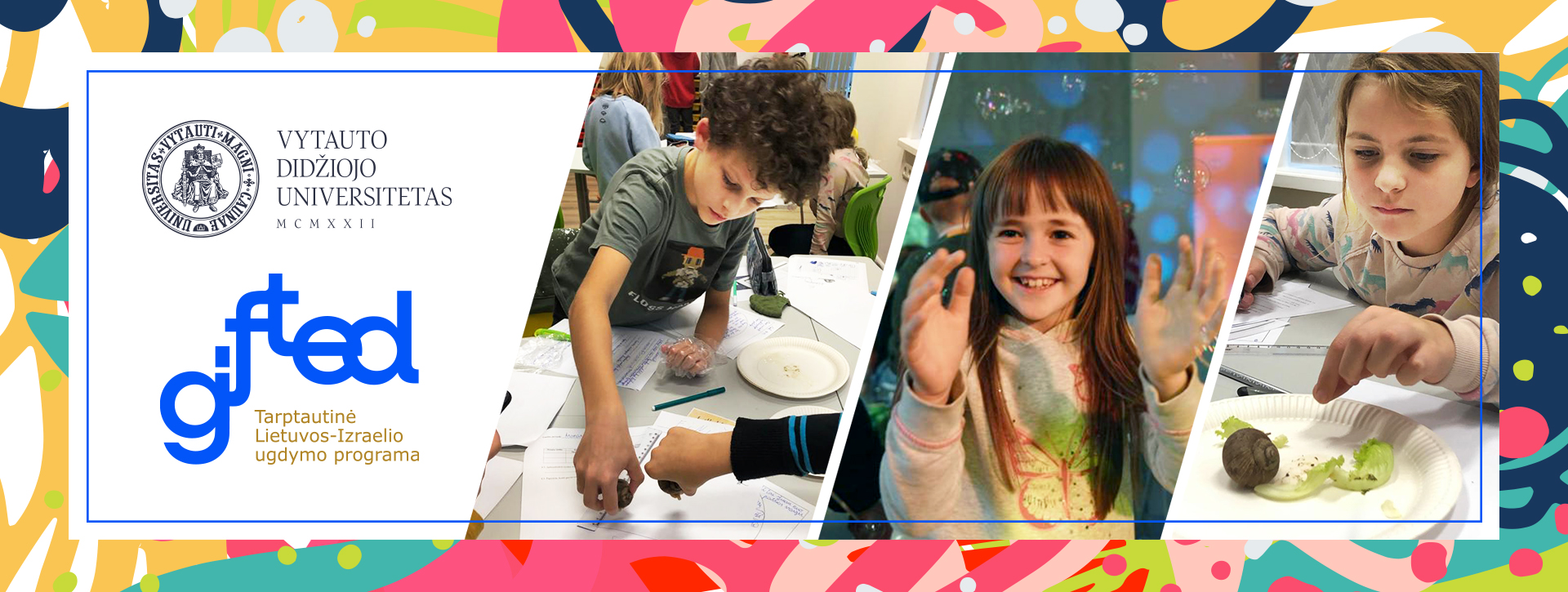Secondary course modules for children under 14 years old.
STEM education module “Flight”
Teacher Mykolas Mališauskas
Lesson topics:
- Methodology of experimental research. Airplanes
- Jet motion
- Gliding
- Hanging objects. Flights
- Kites
- Rockets and satellites
Module “Financial literacy”
Teacher Kornelija Gedrikaitė
Lesson topics:
- Shipwreck
- Where did we end up?
- Where will I live now?
- Where will I get food?
- Danger!
- Rescue
Natural science education module
Teacher Rasa Kirkaitė
Objectives
From biology, chemistry, physics and natural history, we will discover incredible secrets, amazing theories and examine some interesting experiments.
Topics
- Transport of substances (discussing and observing examples in the environment). Practical: Study of the phenomenon of osmosis (potato slices, solutions of different concentrations); Diffusion (using food coloring and more); Turgor pressure (with a balloon or plants).
- Photosynthesis. Experiment by observing the value of light intensity, determining oxygen release, etc. (Required – Elodea twigs).
- How cells breathe (creating a module).
- Cell specialization (depending on the available tools, perhaps observation through a microscope, if not another visual presentation), discussion, brainstorming.
- From cells to the organism – “what about me?”, human energy needs, digestion.
Module “Interesting History (1)”
Teacher Algis Bitautas
Objectives
- To help students form historical consciousness, understanding that today’s world, its order and values are historically conditioned and changing.
- To help students form critical thinking, creativity and communication competencies.
Topics
- Introductory lesson: Names, surnames and nicknames of people in history.
- The most famous battles and military operations.
- The history of women’s emancipation.
- The most influential personalities in Lithuanian history.
- Historical films. What is real and what is not? What are the best-rated historical films?
- A tour of Vilnius’ curiosities.
Expected result: Presentation of students’ research papers.
Module “Interesting History (2)”
Teacher Algis Bitautas
Objectives
- To help students form historical consciousness, understanding that today’s world, its order and values are historically conditioned and changing.
- To help students form critical thinking, creativity, and communication competencies.
Topics
- Introductory lesson:
- The most famous historians and their works: How many and what kind of stories do we have?
- Eleven faiths, or Lithuania not only with Christ, but also with the Jewish Yahweh, the Tatar Allah
- The most influential personalities in world history: classification, tops
- Historical films. What is real and what is not? What are the best-rated historical films?
- A tour of Vilnius’ attractions.
Expected result: Presentation of students’ research papers.
Module “Learning from nature (1)”
Teacher Raimundas Žaltauskas
Objectives
To provide knowledge and ways to learn about the world around us, to see the processes taking place in nature. During the classes, various experiments that require simple, usually easily found tools in nature or at home, will help students learn about the environment, understand the processes taking place in it, and love and preserve the world around them. During the classes, chemical properties of substances, physical natural phenomena are studied, models are created, and the results of observations in nature are interpreted. This encourages them to become active researchers who know the environment and are able to make environmentally friendly decisions.
Topics
- Determining geographical location. Orientation in nature.
- The reaction of organisms to humidity in the environment.
- Determining wind speed.
- Temperature measurements. Heat.
- Properties and flammability of materials.
- Decorative crystals.
- Atmosphere and its pressure.
- Weightlessness. Propagation of sound waves in air.
- Change in water volume. Surface tension. “Cartesian diver”.
Expected result: Able to analyze the studied phenomena occurring in nature, understand the processes taking place, be able to use essential concepts and laws, explain the practical application of these phenomena.
Module “Learning from Nature (2)”
Teacher Raimundas Žaltauskas
Objectives
To provide knowledge and methods on how to get to know the world around us, see the processes occurring in nature. During the classes, by conducting various experiments, which require simple, usually easily found tools in nature or at home, the students will be helped to get to know the environment, understand the processes occurring in it, love the world around them and preserve it. During the classes, the chemical properties of substances, physical natural phenomena are studied, models are created, and the results of observations in nature are interpreted. This encourages them to become an active researcher, familiar with the environment and able to make environmentally friendly decisions.
Topics
- The Golden Rule and the Fibonacci sequence of numbers in nature.
- “Sorting”.
- Surface tension of liquids.
- Transpiration of plants.
- Determining the effect of vision on maintaining balance.
- Determining the dominance of body parts.
- Electromagnetic radiation and human health.
Expected result: Able to analyze the studied phenomena occurring in nature, understand the processes taking place, be able to use essential concepts and laws, and explain the practical application of these phenomena.




